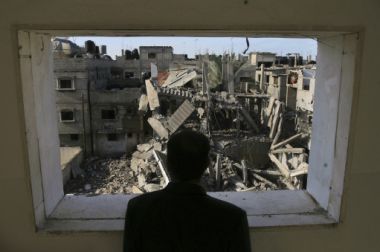Bishop of Worcester: Middle East peace settlement is 'crucial'

The Bishop of Worcester has spoken of his hope to see a a peaceful two-state solution to the Israel-Palestine conflict brokered in the near future.
Bishop John Inge made the comments during a debate in Parliament on Monday raised by Lord Soley.
The debate was on the role of the EU in reaching a peace settlement in the Middle East. Lord Soley asserted that the EU's influence must be used to "get involved in some of the other disputes that trouble us in that region".
In his contribution to the debate, Bishop Inge stressed the need to properly implement EU guidelines on Israeli settlements in the West Bank.
Reaching a peace settlement in the Middle East is "crucial to the entire world", he asserted, noting a personal interest in the Holy land and making clear his position as a "pro-Palestinian Zionist".
"[I am] wholeheartedly committed to the right of Israel to exist securely, and equally committed to the right of the Palestinian people to a viable state in which they can flourish," he said.
"Reaching that is crucial to a wider Middle East peace settlement."
The bishop went on to note the considerable influence of the EU on Israeli settlements. EU guidelines setting out clear consequences for the Israeli government in the event of an attempt to expand its borders were a "good development", he said.
"I do not believe that they change the relationship of the EU to the State of Israel, as has been claimed by some," he said.
"They simply draw practical, if uncomfortable, conclusions from long-standing EU policy."
Bishop Inge expressed his disappointment in the proposed building of further Israeli settlements close to Jerusalem.
"A two-state solution seem[s] to be more remote than ever", he said, suggesting that such a development would "render a contiguous Palestinian state well nigh impossible".
Bishop Inge praised the progress made by US Secretary of State John Kerry, who has been trying to mediate talks between Israeli and Palestinian officials for the past six months.
However, he also expressed sadness that there is as yet "no official framework agreement between Israeli and Palestinian negotiators", and criticised Kerry's remark that "what matters is a settlement, not lots of settlements".
"The expansion of settlements will not help progress towards a lasting and just peace settlement," the bishop said.
The Israeli government's substantial building plans include 1,400 settler homes in an area of the occupied West Bank.
Critics include Israel's own Finance Minister, Yair Lapid, who said they had "complicated" the peace process.
"In every aspect, it seems the world is losing its patience for us," Mr Lapid told the Israeli Ynet news website.
Bishop Inge reaffirmed the need for the EU to expand its efforts towards peace in the Middle East, and urged it to honour its promise to give "financial and other incentives in the event of reaching a peace settlement".
Lord Soley earlier referred to these incentives as "powerful" in offering "an attractive option for both parties to find a settlement and underpins the efforts by the United States to create that agreement".
"In short, as a pro-Palestinian Zionist, I hope that the EU will do everything in its power to enable a just and lasting settlement for the Middle East in general," the bishop concluded.
In her response, Baroness Warsi, senior minister of state at the Foreign and Commonwealth Office, said that the British government has "repeatedly condemned Israel's announcements to expand settlements in the Occupied Palestinian Territories, including east Jerusalem".
She agreed that settlements would undermine a two-state solution to the ongoing conflict, while also warning UK businesses against getting involved, noting that international law states that such building projects are illegal – despite Israel's contestation.
"We are advising British businesses to bear in mind the British Government's view on the illegality of settlements under international law when considering their investment and activities in the region," she finished.











